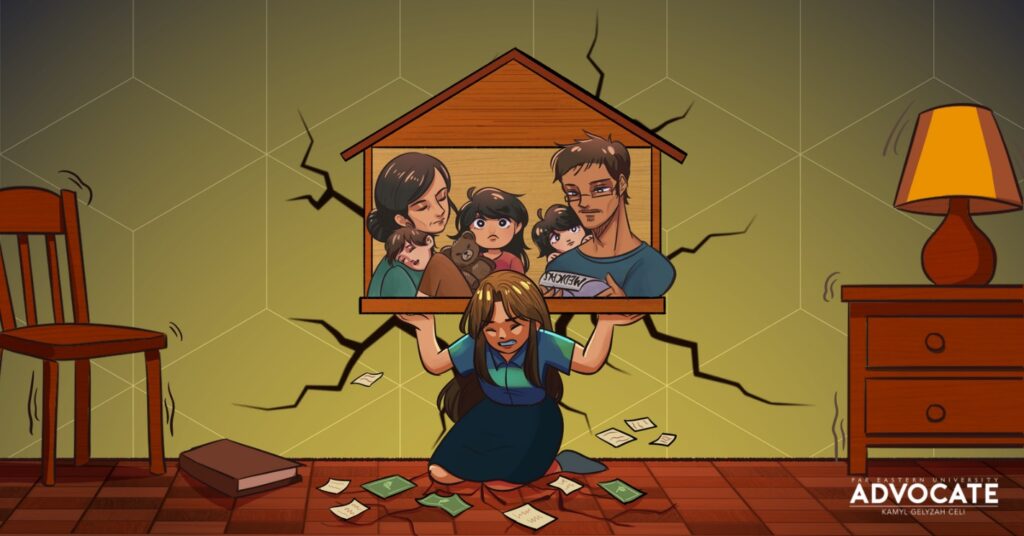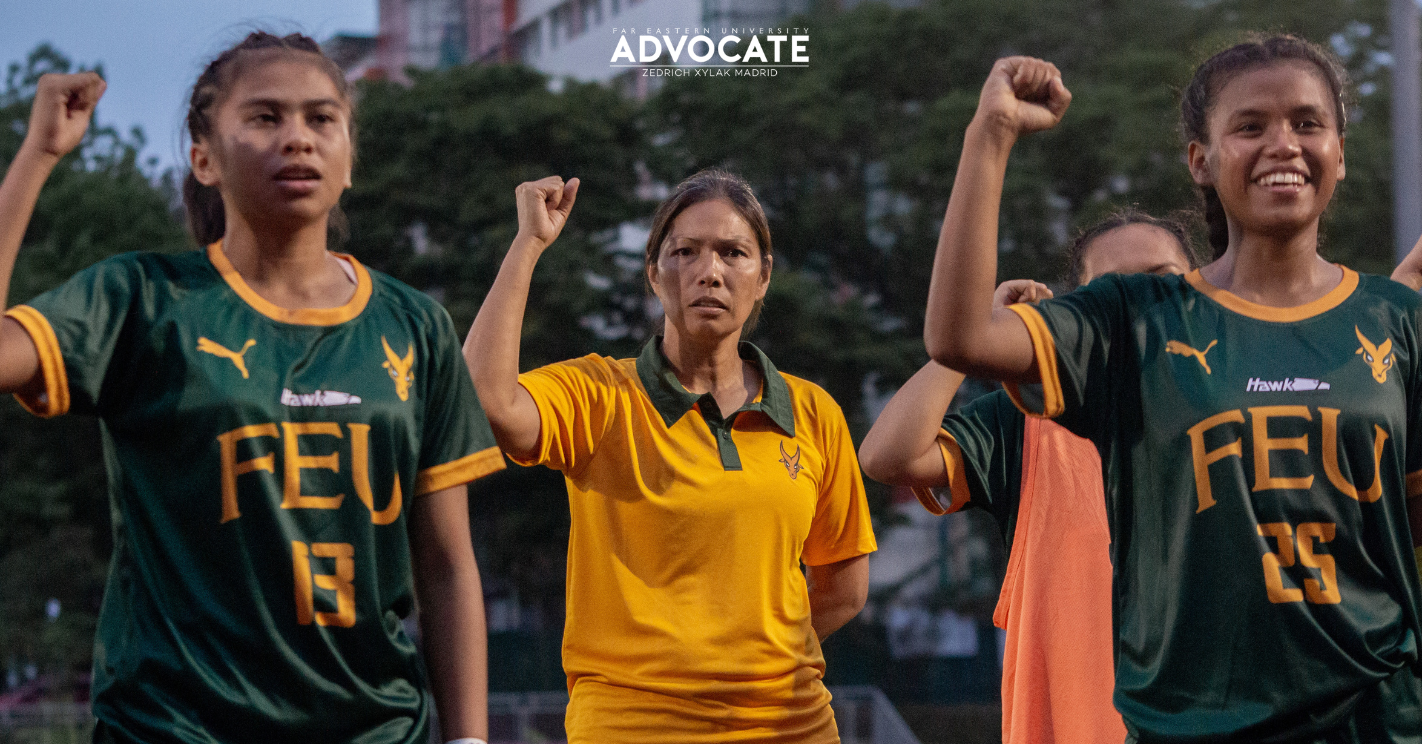
UHS advises using face masks amid pertussis surge
- March 28, 2024 07:41
FEU Advocate
October 11, 2025 16:17

By Franzine Aaliyah Hicana
Before she could even learn how to braid her hair, she learned to weave her family’s needs around her own. The eldest daughter, ‘ate,’ is often praised for her strength, patience, and selflessness. But behind the soft smiles and steady resolve lies a lifetime of unspoken expectations. She is raised to carry, to care, to endure—and was made to believe that it is love. Yet on this International Day of the Girl Child, one must wonder: when did love start to mean surrender?
In countless Filipino households, the eldest daughter’s childhood quietly disappears under layers of obligation. She is the first to wake, the last to rest, the one who knows where everything is and who needs what. While her brothers are allowed to stumble, she must always stand.
What begins as simple ‘helping out’ soon becomes an inherited duty—to fill in, to hold together, to hold back. Yet through it all, she learns to smile, because that is what ‘good daughters’ do.
For many, this story hits close to home, where care is both a virtue and a gendered inheritance. The ate grows up hearing that she is lucky to be trusted, that her sacrifices make her strong.
And so she mistakes exhaustion for maturity, silence for grace, and compliance for love. Generations of eldest daughters have carried this legacy, shaping their lives around everyone else’s until their own dreams blur into the background.
Before we rest, we carry
In an interview with FEU Advocate, Shanaia Reign Ebias, a second-year Nursing student, shared that the phrase “ate ka kasi” carries a heavy weight.
“Honestly, for me, hearing ‘ate ka kasi’ is such a heavy thing to hear, kasi it reminds me to always step back and put my siblings and others in general before myself,” she admitted.
To her, those three words mean more than just birth order—they mean obligation.
“Being an ate comes with so many expectations, na dapat ako ‘yung magpakumbaba, ako ‘yung mag-set ng example, dapat kaya kong tumayo on my own,” she shared.
That sense of responsibility has followed her for as long as she can remember. While other children could afford to make mistakes, she felt she had to ‘know better.’
She was her siblings' source of strength, even when she had no one to turn to herself.
“It also feels like I had to be independent at an early age, learning how to handle things on my own so I could also be there for them,” the Nursing student expressed.
It’s a sentiment shared by many—the quiet burden behind being ‘the dependable one,’ praised for the very thing that often wears you down.
When asked what people misunderstand most about being the eldest, Ebias answered without hesitation.
“People think we’re strong all the time and can handle everything. Pero in reality, hindi naman namin pinili ‘yung role na ‘to—it was just given to us. Parang nawawala ‘yung sense of ‘me.’ Lagi na lang ‘paano naman sila,’ pero bihira ‘yung ‘paano naman ako,” she asserted.
Still, there is love in her words—a tenderness that refuses to resent the people she cares for. For Ebias, being an ate is both a burden and a badge, a role that shaped her into someone tired but also someone strong.
As we give, we grow
For second-year Psychology student Maria Althea Tirzah Ferrer, care was never a command shouted; it was a quiet expectation softly woven into her childhood. She grew up learning that love often meant lending a hand, that being the eldest daughter came with invisible instructions to guide, to give, and to grow faster than the rest.
What began as simple chores—such as, cleaning up and studying hard—slowly evolved into a list of responsibilities that stretched far beyond her years. When her two youngest brothers were born, she took on the tasks of changing diapers, giving milk bottles, and rocking them to sleep.
It was then that the sentence, “Ikaw na. Ate ka, eh,” became both a marker of pride and a measure of duty.
Unlike others who carry resentment toward this role, Ferrer’s story is layered with affection. She admits that being trusted with care made her feel important—that every ‘thank you’ and look of reliance made the work lighter.
“I wanted to be seen as big, strong, and perfect,” she reflected, not out of pressure, but out of love. Her desire to be looked up to became its own reward; her family’s admiration was what made the sleepless nights and sacrifices worth it.
Yet, behind her confidence is a truth that whispers softly; love can turn heavy when it's measured by how much you give, not how much you're seen.
Still, Ferrer recognizes that her experience was softened by something not all eldest daughters receive—consideration.
Her parents, she shared, rarely demanded; they asked.
“They knew those responsibilities were supposed to be theirs. They gave me the chance to say ‘no,’” she said.
That small difference—between being expected and being asked—became the thread that kept her role from turning into a burden. It transformed obligation into choice, and choice into love.
Even the gentlest kind of love comes with a price. It's paid through the missed moments, the sleepless nights, and the small, unspoken sacrifices—sitting through cartoons she never liked, choosing home over freedom, and setting aside her own youth so another could have theirs.
“Those little things really put into perspective how many times I’ve put my siblings first,” Ferrer expressed.
Still, she carries no bitterness—only a clear sense of what must change: that care should be shared, not shouldered, and that love should never come at the cost of oneself.
To her, true support for eldest daughters begins with boundaries, with understanding that care has limits and love does not have to mean self-erasure.
In love, we learn to endure
For Nursing sophomore Danica Obrero, being the eldest daughter was less a title and more a quiet assignment written into her childhood. The age gap between her and her two younger siblings meant she was handed responsibilities long before she understood their weight.
From preparing milk bottles to changing diapers, her hands learned care before they learned rest. When her parents left for work, she became the steady pair of eyes that watched over the house, the small guardian who grew up before she had the chance to simply be young.
While her siblings spent afternoons playing, Obrero learned early on that her time was not always her own.
“I needed to grow up faster,” she admitted.
Every “good job, ate” and reminder to “set a good example” carried both pride and pressure. In their eyes, she was the family’s compass—one wrong turn and the rest might follow. That quiet vigilance made her careful, composed, and always mindful of what it meant to be looked up to.
Still, there were moments when the weight felt too familiar. Care began to feel less like love and more like an obligation.
“It starts to feel like pressure when they expect me to always carry those responsibilities just because I’m the eldest,” she expressed.
Yet, under that pressure, she still found small joys: laughter shared with her siblings, the sweetness of their gratitude, the rare softness of being seen. Those moments, she said, made every sacrifice worth it.
Her parents, aware of the weight she carried, eventually hired help at home—an act that allowed her to breathe, to study, and to reclaim a piece of her own girlhood.
But even with those glimpses of warmth, she often felt the weight of growing up too soon and of carrying responsibilities meant for older shoulders. She learned to understand her role, but deep down, she knew that she was still just a child.
“I understood why I had to help, but I was just a child, too,” she said.
That understanding, rare in many households, kept her sense of care from collapsing into resentment.
Now, she speaks with the gentle authority of someone who has lived both sides of love and labor.
“It’s important to acknowledge that the eldest daughter cannot always carry everything,” she said.
For her, real love is not about endless sacrifice—it is about being allowed to rest, to have boundaries, and to simply be a daughter again.
Until we remember ourselves
For generations, eldest daughters have carried what others could not—turning duty into devotion and exhaustion into grace. They learned to love in the language of sacrifice, to measure their worth by how quietly they endured. Yet even the strongest arms tremble, even the gentlest hearts deserve to beat for themselves.
One day, she will learn that rest is not rebellion, that setting down the weight does not make her any less loving. The world she once held together will keep turning, and in its spin, she will find space to breathe. When she finally lays it down—not in defeat, but in peace—may she remember that she was never meant to carry it all alone.
(Illustration by Kamyl Gelyzah Celi/FEU Advocate)









